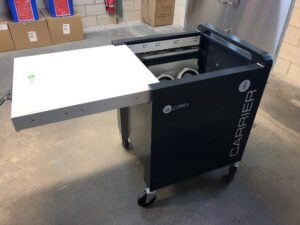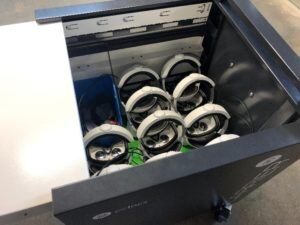Background
TAFE SA is South Australia’s largest vocational education and training provider with over 70,000 enrolled students and 34 campuses. TAFE SA is currently teaching over 29 trades at their Tonsley campus and is one of the leaders in Australia for its trade department.
TAFE SA recently deployed 30 Lenovo Mirage VR headsets to aid education for their Air Conditioning and Refrigeration Servicing Courses. Students have a 1:1 approach with the headsets that allows them to explore and experience high risk areas they would not ordinarily see as apprentices. TAFE SA has also mapped out the entire Tonsley Campus and will be engaging with further software enhancements to allow a freer flowing experience between VR and reality. This will be a huge benefit for current and potential students who have not had the chance to physically tour the campus.
Challenge
At the outset of the project the organisation had no formal mobile device program. As they began planning their device deployment workflow, storage of the VR headsets was an immediate concern. Initially, they attached the devices to a mobile tool trolley; however, they quickly realised the importance of charging and mobility to meet their needs. Because the headsets would travel to different campuses, secure transportation was key to meeting the high demand for training across the state.
Solution
TAFE SA originally enquired about the Revolution 16 Cart and Carrier 30 Cart, ultimately choosing the Carrier 30 Cart because of its durability, portability, and open-concept design. By removing all but one of the device Baskets, it’s possible to charge, store, secure and transport 10 headsets per Cart, with one Large Basket to house all of the accessories for those 10 devices.Quality is a top priority for TAFE SA, which is apparent by their state-of-the-art facilities and their diligence in planning and deploying the VR headsets. This is just one of the reasons TAFE SA chose PC Locs as their storage and charging supplier for their VR headsets.
VR in Education
VR is a new and expanding technology in education. According to TAFE SA; anecdotal evidence suggests that the use of VR in the classroom increases a student’s ability to retain information by 60-70%. VR technology also allows students training in hazardous jobs to perform tasks without exposure to hazardous high-risk environments. Furthermore, mobility of technology provides accessibility to world-class facilities and training for remote students without the burden of travelling or relocating.TAFE SA’s hands-on approach with VR technology is also transferable to rehabilitation clinics, other education providers, and the workplace. VR is transforming education, and it’s only a matter of time before pilot trials such as the one at TAFE SA will begin to trickle into different sectors.
 |
 |
